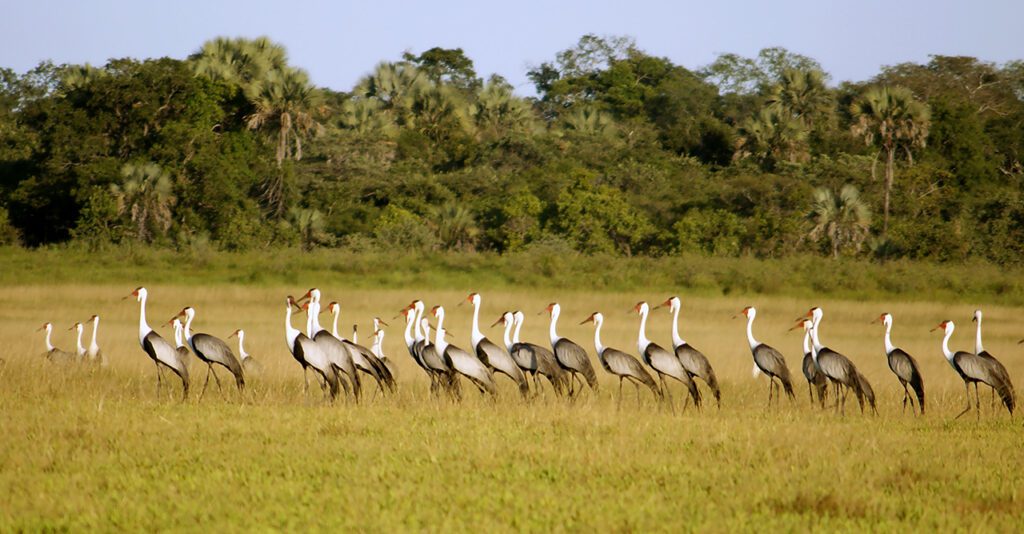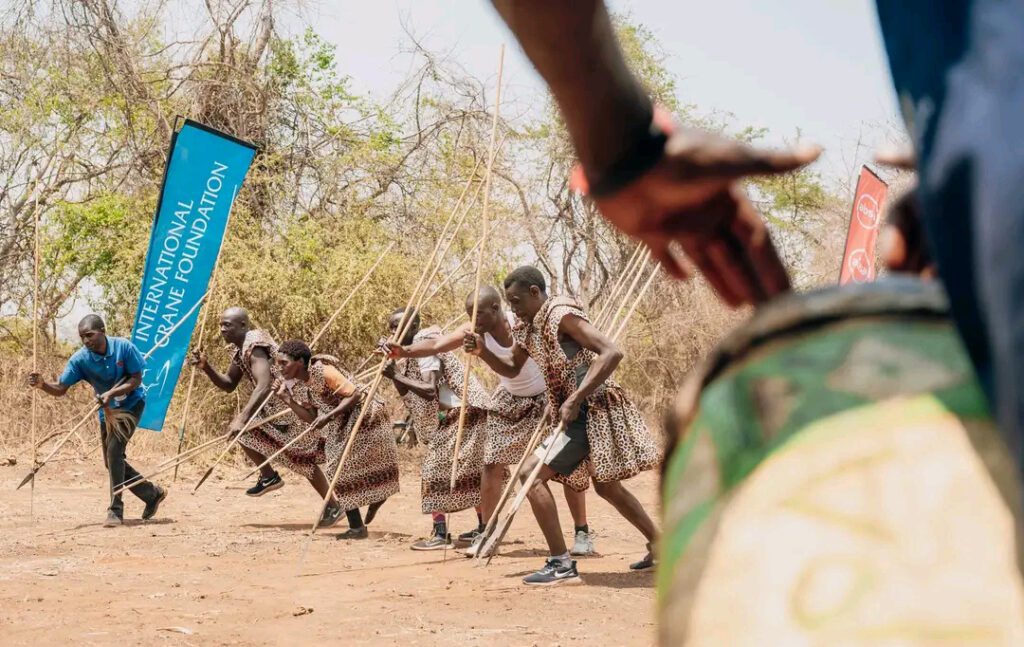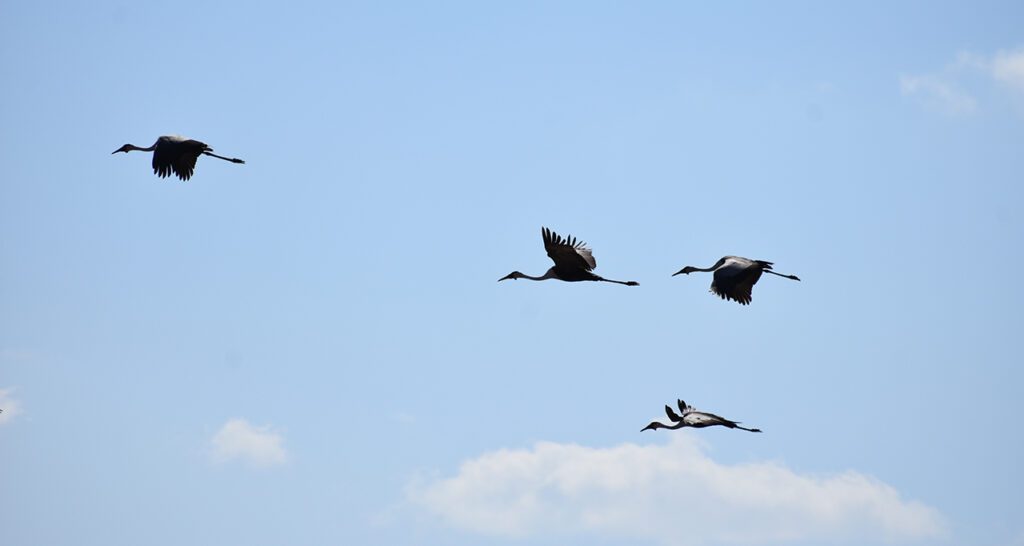Agroforestry for a Resilient Future in Uganda
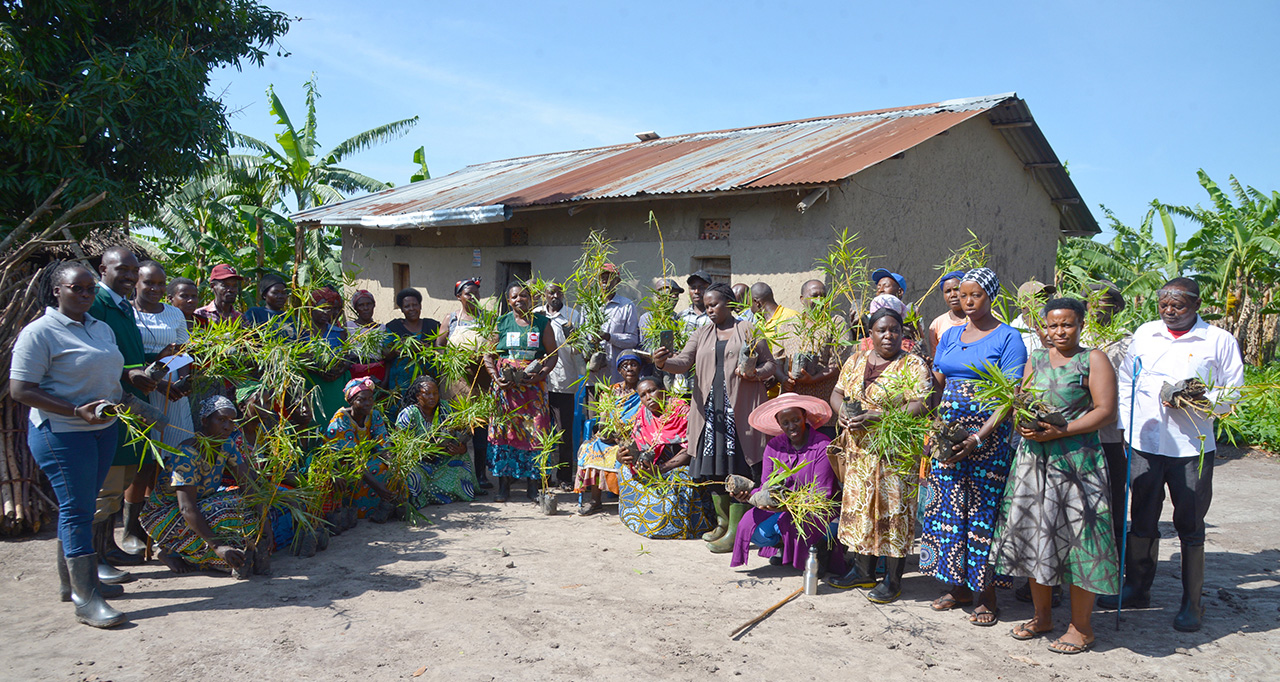
Community members gather for a distribution of bamboo seedlings to plant for erosion control. International Crane Foundation photos
In Uganda, natural ecosystems, especially wetlands, face growing threats from climate change, deforestation, and unsustainable land-use practices such as wetland conversion and sand mining. These pressures have reduced both agricultural productivity and biodiversity.
As a result, approximately 30% of Ugandans experience moderate food insecurity, while the Grey Crowned Crane, Uganda’s national bird, is increasingly endangered due to habitat loss. The International Crane Foundation’s Uganda Program recognizes that conserving cranes must go hand in hand with improving community wellbeing. Agroforestry, therefore, provides an integrative solution — enhancing productivity while protecting habitats.
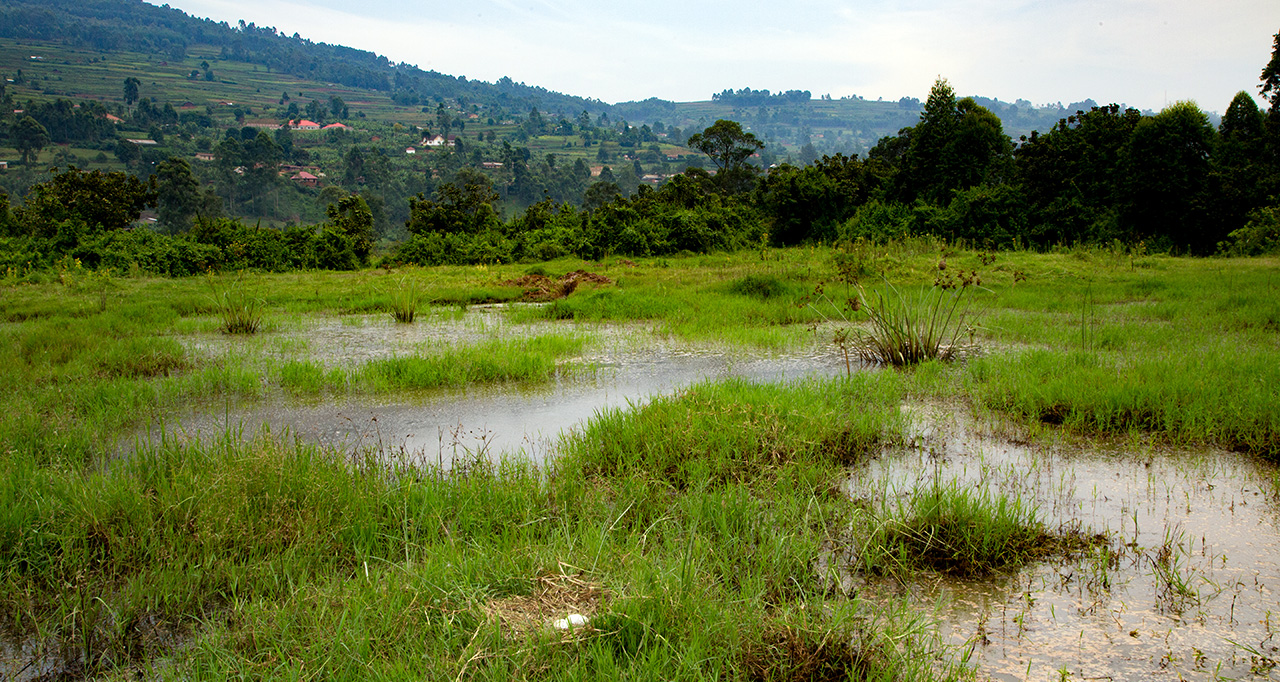 Farms surrounding a wetland basin with a Grey Crowned Crane nest. Photo by Margaret Pyke Trust
Farms surrounding a wetland basin with a Grey Crowned Crane nest. Photo by Margaret Pyke Trust
The International Crane Foundation’s agroforestry initiatives in Mbarara, Lwengo, and Rukiga Districts use a participatory, bottom-up approach involving local farmers in planning and implementation. Our key interventions include tree–crop–livestock integration systems to enrich soils, control erosion, and diversify incomes. We select tree species suited to local ecological and economic conditions, including Ficus natalensis, Maesopsis eminii, Grevillea robusta, Calliandra calothyrsus, and Azadirachta indica (neem), as well as fruit trees such as avocado, mango, and guava. In addition, bamboo and Napier grass are used for soil stabilization. Communities have further integrated complementary enterprises, such as mushroom and honey production, to reduce dependence on wetland resources.
As a result, 104.1 hectares of wetlands have been restored across south-central Uganda, along with improved food and income security through tree-based enterprises and value addition. In addition, communities are empowered through the formation of 40 farmer groups and training in sustainable practices. The results demonstrate that conservation and livelihood goals can be achieved simultaneously, creating healthy ecosystems that sustain both people and wildlife.
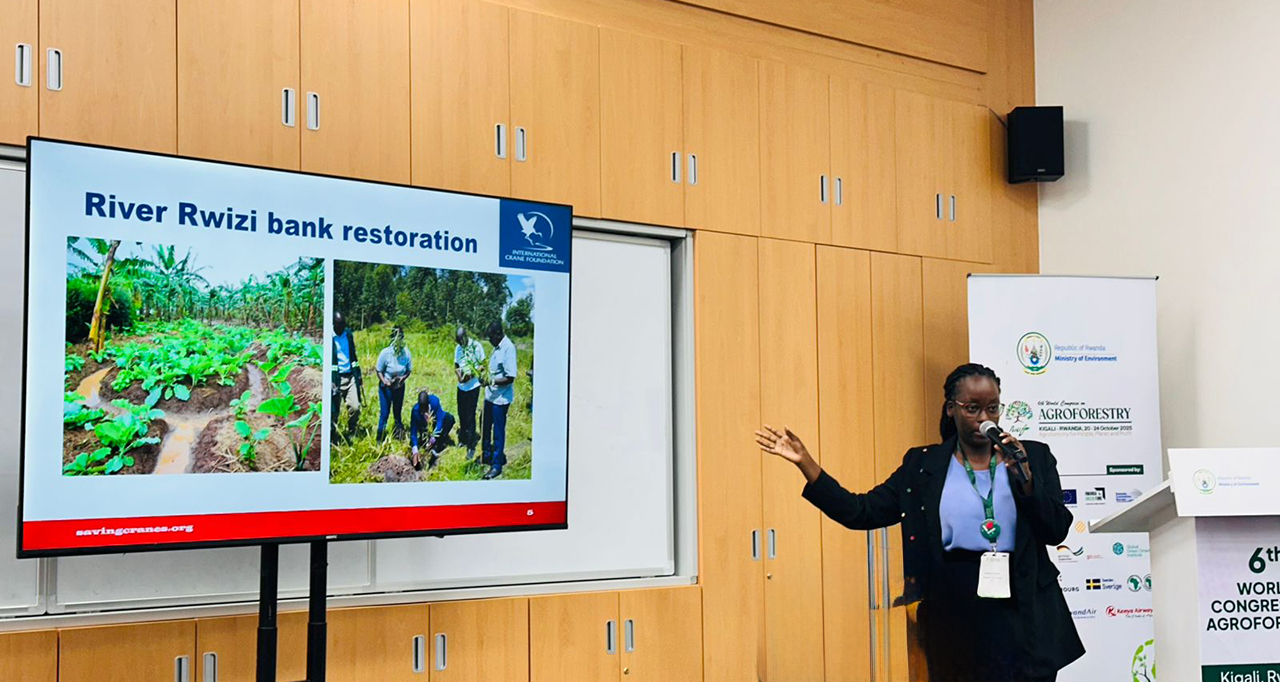 Uganda Program Field Officer Sarah Kugonza presents at the 6th World Agroforestry Congress in Kigali, Rwanda.
Uganda Program Field Officer Sarah Kugonza presents at the 6th World Agroforestry Congress in Kigali, Rwanda.
6th World Agroforestry Congress
The 6th World Agroforestry Congress took place from 20th to 24th October 2025 at the Kigali Convention Centre in Rwanda, under the theme “Agroforestry for a Resilient Future: Strengthening Food Systems and Restoring Ecosystems.” The event brought together over 1,200 participants from across the globe, including researchers, practitioners, policymakers, development partners, and community leaders.
Among the many insightful presentations, a standout came from Ms. Sarah Kugonza, representing the International Crane Foundation Uganda. Her presentation, “Agroforestry as a Path to Food Security, Climate Resilience, and Sustainable Landscapes: Insights from South-central and South-western Uganda,” highlighted the International Crane Foundation’s ongoing work linking biodiversity conservation with livelihood improvement.
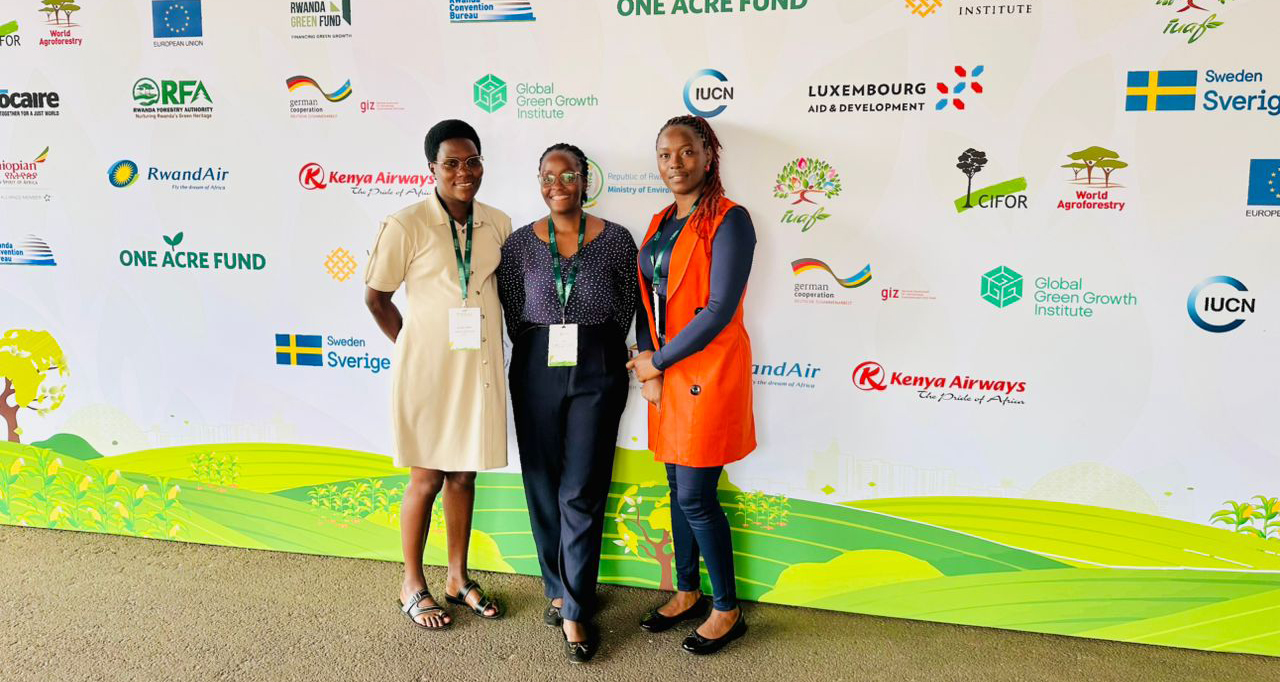 Uganda Program Field Officers Neema Obiera and Senior Field Officer Eva Tokoi with Sarah (center) at the conference.
Uganda Program Field Officers Neema Obiera and Senior Field Officer Eva Tokoi with Sarah (center) at the conference.
Organized as the premier platform for advancing knowledge and practice in agroforestry, the Congress showcased how tree-based farming systems can address pressing global challenges — from food insecurity and land degradation to biodiversity loss and climate change. Notable organizations represented included the World Agroforestry Centre (ICRAF), FAO, World Bank, IUCN, African Union Commission, International Crane Foundation, One Acre Fund, Rwanda Forest Authority, and GIZ, among others.
Key resolutions adopted at the Congress included:
- Promoting inclusive agroforestry models that empower women and youth.
- Strengthening cross-border research partnerships and capacity building.
- Developing monitoring frameworks to track socio-economic and ecological impacts.
- Establishing regional centers of excellence for agroforestry research and training in Africa.
These outcomes position agroforestry not just as a climate adaptation tool but as a cornerstone of sustainable landscape management and resilience-building across Africa.
The 6th World Agroforestry Congress reaffirmed that the future of sustainable agriculture lies in integrated approaches that work for both people and the planet. Through its Uganda-based initiatives, the International Crane Foundation demonstrated how agroforestry can restore ecosystems, secure food systems, and protect species such as the Grey Crowned Crane. As delegates concluded in Kigali, building a resilient and equitable future will depend on scaling up such holistic approaches — where trees, communities, and conservation thrive together.
